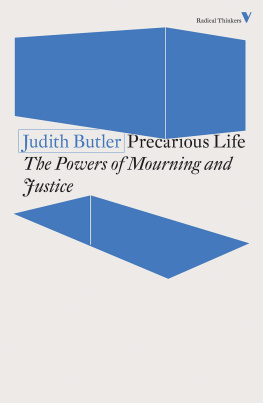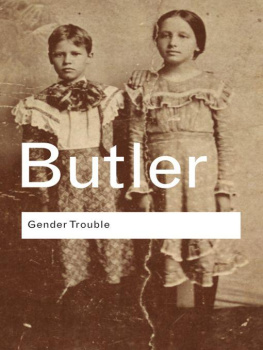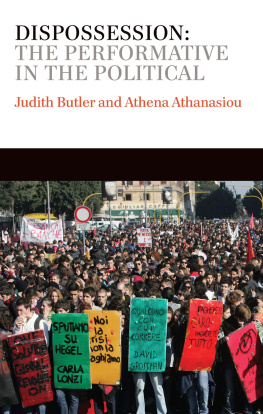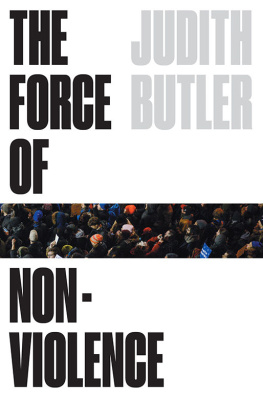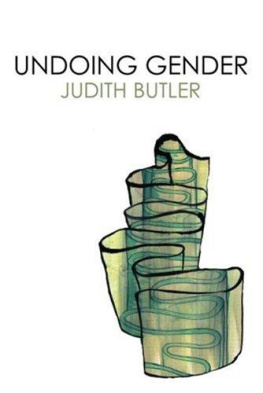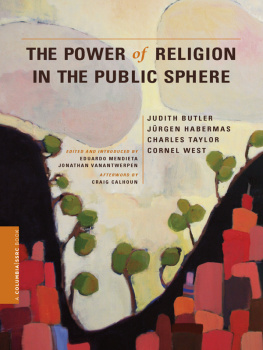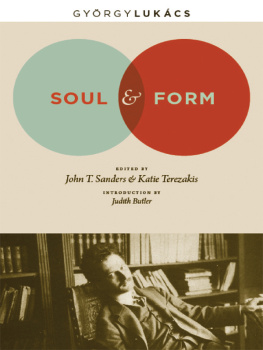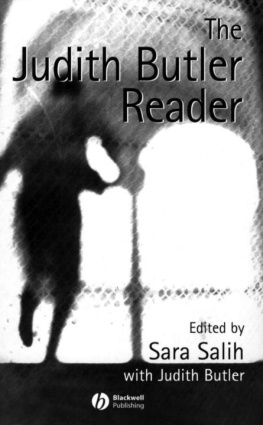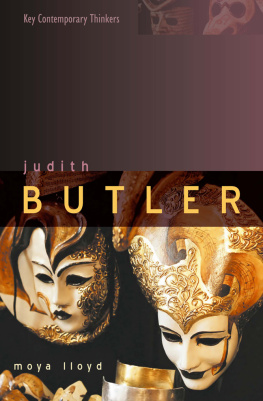Judith Butler - Precarious Life
Here you can read online Judith Butler - Precarious Life full text of the book (entire story) in english for free. Download pdf and epub, get meaning, cover and reviews about this ebook. publisher: Verso Books, genre: Politics. Description of the work, (preface) as well as reviews are available. Best literature library LitArk.com created for fans of good reading and offers a wide selection of genres:
Romance novel
Science fiction
Adventure
Detective
Science
History
Home and family
Prose
Art
Politics
Computer
Non-fiction
Religion
Business
Children
Humor
Choose a favorite category and find really read worthwhile books. Enjoy immersion in the world of imagination, feel the emotions of the characters or learn something new for yourself, make an fascinating discovery.
- Book:Precarious Life
- Author:
- Publisher:Verso Books
- Genre:
- Rating:3 / 5
- Favourites:Add to favourites
- Your mark:
- 60
- 1
- 2
- 3
- 4
- 5
Precarious Life: summary, description and annotation
We offer to read an annotation, description, summary or preface (depends on what the author of the book "Precarious Life" wrote himself). If you haven't found the necessary information about the book — write in the comments, we will try to find it.
Precarious Life — read online for free the complete book (whole text) full work
Below is the text of the book, divided by pages. System saving the place of the last page read, allows you to conveniently read the book "Precarious Life" online for free, without having to search again every time where you left off. Put a bookmark, and you can go to the page where you finished reading at any time.
Font size:
Interval:
Bookmark:

PRECARIOUS LIFE

AND VIOLENCE


This paperback edition first published by Verso 2020
First published by Verso 2004
Judith Butler 2004, 2006, 2020
All rights reserved
The moral rights of the author have been asserted
1 3 5 7 9 10 8 6 4 2
Verso
UK: 6 Meard Street, London W1F 0EG
USA: 20 Jay Street, Suite 1010, Brooklyn, NY 11201
www.versobooks.com
Verso is the imprint of New Left Books
ISBN-13: 978-1-78873-861-3
ISBN-13: 978-1-78960-242-5 (US EBK)
ISBN-13: 978-1-83976-303-8 (UK EBK)
British Library Cataloguing in Publication Data
A catalogue record for this book is available from the British Library
Library of Congress Cataloging-in-Publication Data
A catalog record for this book is available from the Library of Congress
For Isaac,
who imagines otherwise
I am grateful to the Guggenheim Foundation and the Princeton University Center for Human Values for funding the 200102 academic year when work on these essays began. I also thank Amy Jamgochian for her patient and thorough work on the manuscript and Benjamin Young and Stuart Murray for their helpful work. Wendy Brown and Joan Scott read many of these words, and their extraordinary persistence as vigorous interlocutors has been crucial to the completing of this work.
Explanation and Exoneration appeared first in Theory and Event, 5:4, and was reprinted in Social Text, no. 72. Violence, Mourning, Politics appeared first in Studies in Gender and Sexuality, 4:1, and represents a reworked version of the Kessler Lecture delivered in December, 2001 at the Center of Lesbian and Gay Studies at CUNY. Indefinite Detention appeared first in a reduced form in Victor Goldberg, ed., Its a Free Country: Personal Liberties after 9/11, New York: RMD Press, 2002; an earlier version appeared in part as Guantanamo Limbo, in the Nation, April 1, 2002. The Charge of Anti-Semitism was published in reduced form by the London Review of Books, August 21, 2003.
The five essays collected here were all written after September 11, 2001, and in response to the conditions of heightened vulnerability and aggression that followed from those events. It was my sense in the fall of 2001 that the United States was missing an opportunity to redefine itself as part of a global community when, instead, it heightened nationalist discourse, extended surveillance mechanisms, suspended constitutional rights, and developed forms of explicit and implicit censorship. These events led public intellectuals to waver in their public commitment to principles of justice and prompted journalists to take leave of the time-honored tradition of investigative journalism. That US boundaries were breached, that an unbearable vulnerability was exposed, that a terrible toll on human life was taken, were, and are, cause for fear and for mourning; they are also instigations for patient political reflection. These events posed the question, implicitly at least, as to what form political reflection and deliberation ought to take if we take injurability and aggression as two points of departure for political life.
That we can be injured, that others can be injured, that we are subject to death at the whim of another, are all reasons for both fear and grief. What is less certain, however, is whether the experiences of vulnerability and loss have to lead straightaway to military violence and retribution. There are other passages. If we are interested in arresting cycles of violence to produce less violent outcomes, it is no doubt important to ask what, politically, might be made of grief besides a cry for war.
One insight that injury affords is that there are others out there on whom my life depends, people I do not know and may never know. This fundamental dependency on anonymous others is not a condition that I can will away. No security measure will foreclose this dependency; no violent act of sovereignty will rid the world of this fact. What this means, concretely, will vary across the globe. There are ways of distributing vulnerability, differential forms of allocation that make some populations more subject to arbitrary violence than others. But in that order of things, it would not be possible to maintain that the US has greater security problems than some of the more contested and vulnerable nations and peoples of the world. To be injured means that one has the chance to reflect upon injury, to find out the mechanisms of its distribution, to find out who else suffers from permeable borders, unexpected violence, dispossession, and fear, and in what ways. If national sovereignty is challenged, that does not mean it must be shored up at all costs, if that results in suspending civil liberties and suppressing political dissent. Rather, the dislocation from First World privilege, however temporary, offers a chance to start to imagine a world in which that violence might be minimized, in which an inevitable interdependency becomes acknowledged as the basis for global political community. I confess to not knowing how to theorize that interdependency. I would suggest, however, that both our political and ethical responsibilities are rooted in the recognition that radical forms of self-sufficiency and unbridled sovereignty are, by definition, disrupted by the larger global processes of which they are a part, that no final control can be secured, and that final control is not, cannot be, an ultimate value.
These essays begin the process of that imagining, although there are no grand utopian conclusions here. The first essay begins with the rise of censorship and anti-intellectualism that took hold in the fall of 2001 when anyone who sought to understand the reasons for the attack on the United States was regarded as someone who sought to exonerate those who conducted that attack. Editorials in the New York Times criticized excuseniks, exploiting the echoes of peaceniksunderstood as naive and nostalgic political actors rooted in the frameworks of the sixtiesand refuseniksthose who refused to comply with Soviet forms of censorship and control and often lost employment as a result. If the term was meant to disparage those who cautioned against war, it inadvertently produced the possibility of an identification of war resistors with courageous human rights activists. The effort at disparagement revealed the difficulty of maintaining a consistently negative view of those who sought a historical and political understanding of the events of September 11 much less of those who opposed war against Afghanistan as a legitimate response.
I argue that it is not a vagary of moral relativism to try to understand what might have led to the attacks on the United States. Further, one canand ought toabhor the attacks on ethical grounds (and enumerate those grounds), feel a full measure of grief for those losses, but let neither moral outrage nor public mourning become the occasion for the muting of critical discourse and public debate on the meaning of historical events. One might still want to know what brought about these events, want to know how best to address those conditions so that the seeds are not sown for further events of this kind, find sites of intervention, help to plan strategies thoughtfully that will not beckon more violence in the future. One can even experience that abhorrence, mourning, anxiety, and fear, and have all of these emotional dispositions lead to a reflection on how others have suffered arbitrary violence at the hands of the US, but also endeavor to produce another public culture and another public policy in which suffering unexpected violence and loss and reactive aggression are not accepted as the norm of political life.
Font size:
Interval:
Bookmark:
Similar books «Precarious Life»
Look at similar books to Precarious Life. We have selected literature similar in name and meaning in the hope of providing readers with more options to find new, interesting, not yet read works.
Discussion, reviews of the book Precarious Life and just readers' own opinions. Leave your comments, write what you think about the work, its meaning or the main characters. Specify what exactly you liked and what you didn't like, and why you think so.

